Know about the infection-prone zones and how to avoid getting infected
Airplanes create an environment for germs to thrive in and enable it to transfer from person to person – close quarters, frequent passenger turnaround and recirculated air. The cabins are usually cleaned when the plane stays overnight at the airport, the germs can last up to 24 hours on hard surfaces and can linger between flights.
About 80% of all infectious diseases we introduce to ourselves on flights. According to a study by a US-based website which collected bacteria samples on flights at five different airports, there are certain areas, the “hotspots” we are most likely to touch that are infection-prone such as – the tray table, overhead vent, bathroom flush button/lock, seat pockets, and seatbelt buckle. However, the dirtiest is the drinking fountain buttons at the airports.
Here are 8 ways to stay healthy while flying.
1. Sanitize surface areas – Humans touch their faces about 200 times a day. The chances of one walking by or touching a contaminated surface then unwittingly touching their face are higher. On all the typically germy surfaces, especially tray tables, use a hand sanitizer with at least 60 percent alcohol. When you get settled 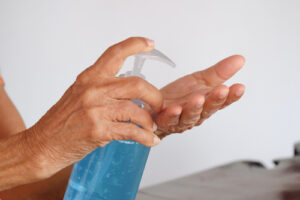 in your seat, put several drops on a wet wipe and wipe down those areas that you’re going to touch. Use hand sanitizer frequently throughout your flight, particularly when you lower the tray table to eat and after you return from the bathroom – even if you’ve washed your hands with warm, soapy water. Those seat pockets can be tricky to clean, you may want to use your own bag under the seat to store your belongings.
in your seat, put several drops on a wet wipe and wipe down those areas that you’re going to touch. Use hand sanitizer frequently throughout your flight, particularly when you lower the tray table to eat and after you return from the bathroom – even if you’ve washed your hands with warm, soapy water. Those seat pockets can be tricky to clean, you may want to use your own bag under the seat to store your belongings.
2. Flu shot for your immune system – 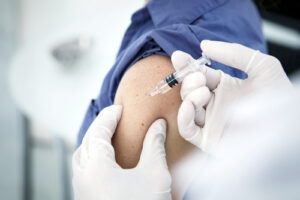 If you’re flying during flu season ensure taking a flu shot. Influenza spreads by droplets made when people sneeze or cough, even from as far away as six feet. Especially in a crammed in space. While there’s no guarantee that the vaccine will prevent the flu, it will certainly lower your chances of contracting it, and if you do contract it, your illness is likely to be less severe.
If you’re flying during flu season ensure taking a flu shot. Influenza spreads by droplets made when people sneeze or cough, even from as far away as six feet. Especially in a crammed in space. While there’s no guarantee that the vaccine will prevent the flu, it will certainly lower your chances of contracting it, and if you do contract it, your illness is likely to be less severe.
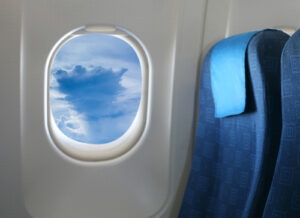
3. Opt for the window seat and consider wearing a mask – A study published in the Clinical Infectious Disease, Boston mentions passengers in the aisle seats are more likely to contract infections. Especially for seniors with health conditions, the aisle seats put you in a more vulnerable position, with all those potentially sick passengers walking (and sneezing) past. Plus, people may steady themselves by grabbing your headrest when heading to and from the restroom, to make matters worse, the hand-washing conditions are not ideal. Hence it is essential to wear a mask during this time.
 4. Control the airflow – The filters in the air vent remove 99.97% of germs. However, that doesn’t help when you are seated next to a person with flu. Use the overhead air vent on a low setting to create an air current that will move germs away. Place your hands just below your belly button, two inches away from your body and you should be able to feel the airflow.
4. Control the airflow – The filters in the air vent remove 99.97% of germs. However, that doesn’t help when you are seated next to a person with flu. Use the overhead air vent on a low setting to create an air current that will move germs away. Place your hands just below your belly button, two inches away from your body and you should be able to feel the airflow.
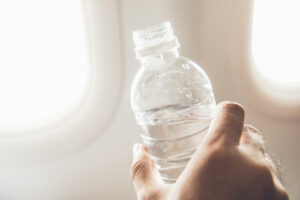 5. Stay hydrated – The humidity in the flight drops 10% after takeoff, contributing to the breath of passengers. That dry air can do a number on the mucous membranes in your nose and airways, which need hydration to do their job. Drinking plenty of water will counter the dehydrating effects of air travel and most airlines provide a bottle of water. It is important to drink plenty of water especially if you are on medication.
5. Stay hydrated – The humidity in the flight drops 10% after takeoff, contributing to the breath of passengers. That dry air can do a number on the mucous membranes in your nose and airways, which need hydration to do their job. Drinking plenty of water will counter the dehydrating effects of air travel and most airlines provide a bottle of water. It is important to drink plenty of water especially if you are on medication.
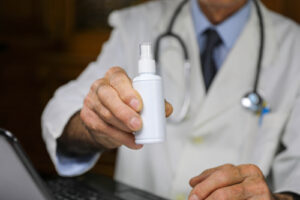 6. Keep a nasal spray handy – Our mucous membranes are far less effective at blocking infection if they dry out. Look for a saline spray. It has the same pH as the delicate tissues in your nose. Avoid medicated nasal sprays or anything with preservatives, which can dry out nasal passages. While you’re at it, stash a small bottle of eye drops in your bag. They’ll relieve dry, itchy eyes, making you a lot less likely to rub them with (possibly) contaminated fingers.
6. Keep a nasal spray handy – Our mucous membranes are far less effective at blocking infection if they dry out. Look for a saline spray. It has the same pH as the delicate tissues in your nose. Avoid medicated nasal sprays or anything with preservatives, which can dry out nasal passages. While you’re at it, stash a small bottle of eye drops in your bag. They’ll relieve dry, itchy eyes, making you a lot less likely to rub them with (possibly) contaminated fingers.
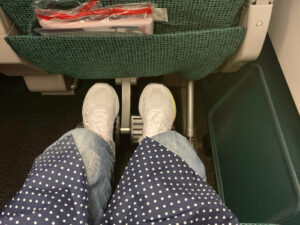 7. Stretch your legs – The position of the seatback tends to slow circulation, putting us at risk for deep-vein thrombosis, the formation of blood clots in the legs. Since most flights are packed for holiday travel, you’re more likely to remain seated. Resist the urge to stay put, and move about the cabin every hour or so. With your feet flat on the floor, bring your heels up and down, in a rocking motion. And if you are over 60 or obese, or have a history of heart disease, varicose veins or blood clots, see your doctor before your trip, especially if the flight is longer than two hours.
7. Stretch your legs – The position of the seatback tends to slow circulation, putting us at risk for deep-vein thrombosis, the formation of blood clots in the legs. Since most flights are packed for holiday travel, you’re more likely to remain seated. Resist the urge to stay put, and move about the cabin every hour or so. With your feet flat on the floor, bring your heels up and down, in a rocking motion. And if you are over 60 or obese, or have a history of heart disease, varicose veins or blood clots, see your doctor before your trip, especially if the flight is longer than two hours.
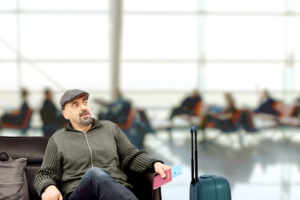
8. Relax – The effect of stress lowers our immune system and the ability to fight off germs. Worry of getting to the airport, check-in, getting to the right gate leads in anxious behavior – rubbing eyes or biting nails and that a disaster. Keep calm and get to the airport early for your flight to eliminate stressors.
Finally, it would a good idea to carry your food along. It is way healthier than the food served in the aircraft that has been through many hands.
Know more about Coronavirus (COVID-19), its symptoms and the precautionary messures – Click Here









I have been flying since September,4 2019 till date minimum 5 times a month. Indigo Spice Jet Bangalore Jaipur Mumbai Ahmedabad Surat. Long before the Virus outbreak I use sanitizer Day in And out. I use my residence restroom preferred to airplane And if I do use then my sanitizer is always used before using the seat. Parveen Shaikh Age 57 flying Isle seat All the while.
[…] life but make sure you are taking all the precautionary measures at home and while flying. Here are 8 precautions that you must take if you are flying to ensure your safety from getting […]
I found quite informative time to time.Specially current Cornava- Virus Preventive Precations R Very Relavant In Current Scenerio To Avoid Comfusions With Clear Directions To Follow.
Thanks A Ton.
Thanks for explaining all precautions.
The article is quite informative and good during the present scenario otherwise also it is better to have some knowledge.
Good suggestions for safe and healthy flight.
That’s very useful information . Thanks for sharing ..I am also using
Great advice to follow
[…] read about how to avoid infections while traveling, how to prepare for a potential outbreak and precautionary measures for […]
Comments are closed.